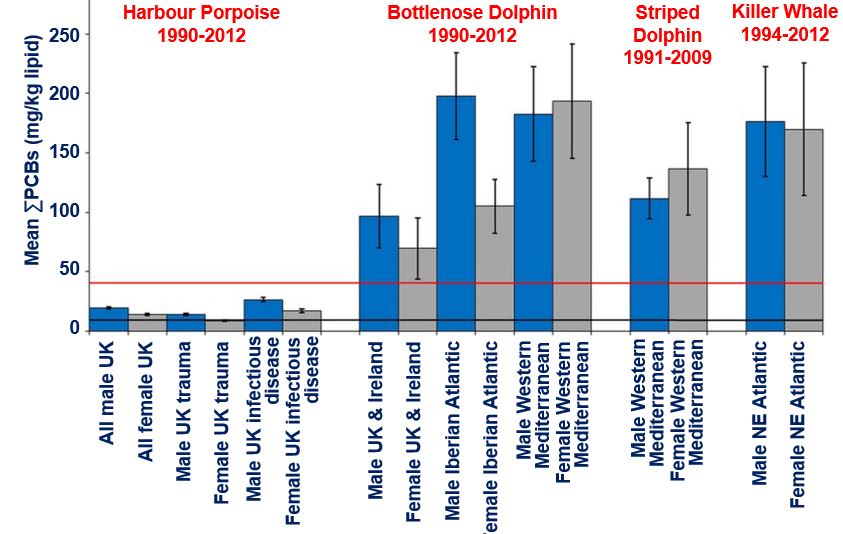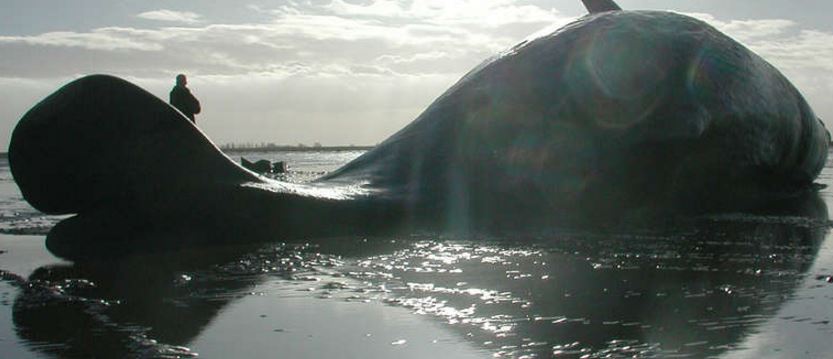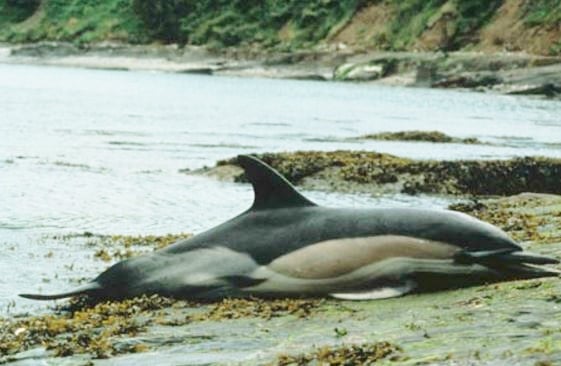Orcas and dolphins are facing European extinction due to the lingering effects of PCBs (polychlorinated biphenyls), which were banned in the 1980s, says a group of scientists from the Zoological Society of London. PCBs are known to increase the mortality rate among newborn calves and make it more likely that pregnant mothers abort.
Dr. Paul Jepson and colleagues wrote about their study and findings in the academic journal Scientific Reports.
Their conclusions are based on long term studies involving over one thousand stranded or biopsied dolphins, whales and porpoises (cetaceans). They found that the blubber of European orcas (Orcinus orca), striped dolphins (Stenella coeruleoalba) and bottlenose dolphins (Tursiops truncatus) contain high concentrations of PCBs compared to the same species in other parts of the world.
 Mean ∑PCBs concentrations. Blue bars are adult males and grey bars adult females. The lower line is the equivalent ∑PCBs concentration threshold for onset of physical effects in marine mammal studies. The upper line is the equivalent threshold for the highest PCB toxicity threshold. (Image: nature.com)
Mean ∑PCBs concentrations. Blue bars are adult males and grey bars adult females. The lower line is the equivalent ∑PCBs concentration threshold for onset of physical effects in marine mammal studies. The upper line is the equivalent threshold for the highest PCB toxicity threshold. (Image: nature.com)
PCBs are banned, but once widely used
PCBs are a group of artificial chemicals formerly used in the manufacture of paints, carbonless copy paper, flame retardants, hydraulic fluids, surgical implants and other products.
High exposure to PCBs is known to undermine the immune systems of cetaceans. Studies have shown they are also likely to increase mortality among newborn calves and cause abortions.
Lead author Dr. Jepson, a specialist wildlife veterinarian at the Zoological Society of London’s Institute of Zoology, explained:
“The long life expectancy and position as apex or top marine predators make species like killer whales and bottlenose dolphins particularly vulnerable to the accumulation of PCBs through marine food webs.”
PCB concentrations still high despite ban
The authors found that despite the ban and initial decline in concentrations of PCBs, levels are still dangerously high, as far as European cetaceans are concerned.
Dr. Jepson added:
“Few coastal orca populations remain in western European waters. Those that do persist are very small and suffering low or zero rates of reproduction. The risk of extinction therefore appears high for these discrete and highly contaminated populations.”
“Without further measures, these chemicals will continue to suppress populations of orcas and other dolphin species for many decades to come.”
 Much of the data in this study came from biopsies carried out on stranded killer whales. (Image: zsl.org)
Much of the data in this study came from biopsies carried out on stranded killer whales. (Image: zsl.org)
PCB hotspots near industrial areas
Europe has a number of PCB hotspots, the scientists pointed out, including the south-west Iberian Peninsula and the western Mediterranean Sea.
PBC concentrations are greater near densely-populated urban areas and industrial regions. Many Mediterranean coasts, such as that of Barcelona in Spain, are densely populated and highly industrial.
Co-author Robin Law, Emeritus Research Fellow, Cefas (Centre for Environment, Fisheries and Aquaculture Science), Lowestoft, said:
“Our research underlines the critical need for global policymakers to act quickly and decisively to tackle the lingering toxic legacy of PCBs, before it’s too late for some of our most iconic and important marine predators.”
“We also need to better understand the various pathways through which these iconic species are able to accumulate such high PCB concentrations through their diets.”
 The Sea Watch Foundation says if you see a stranded cetacean you should telephone for help immediately. Calmly approach the animal, but be careful – it could make a sudden movement. If you have help, roll the animal onto its front and keep the skin wet with seawater. Don’t pull its fins or tail, and make sure water does not get into the blowhole. Keep pets and crowds away, and avoid loud noises or sudden movements. Don’t try to drag it. “Be careful, as these are large powerful animals.” (Image: seawatchfoundation.org.uk)
The Sea Watch Foundation says if you see a stranded cetacean you should telephone for help immediately. Calmly approach the animal, but be careful – it could make a sudden movement. If you have help, roll the animal onto its front and keep the skin wet with seawater. Don’t pull its fins or tail, and make sure water does not get into the blowhole. Keep pets and crowds away, and avoid loud noises or sudden movements. Don’t try to drag it. “Be careful, as these are large powerful animals.” (Image: seawatchfoundation.org.uk)
The Zoological Society of London is a partner in the British Cetacean Strandings Investigation Programme (CSIP), which was set up in 1990 to coordinate studies on all dolphins, porpoises and whales that strand along the UK coastline, as well as any basking sharks and marine turtles. The programme is funded by the Devolved Governments of Wales and Scotland and Defra (Department for Environment, Food and Rural Affairs).
In an Abstract in the journal, the authors concluded:
“Despite regulations and mitigation measures to reduce PCB pollution, their biomagnification in marine food webs continues to cause severe impacts among cetacean top predators in European seas.”
Citation: “PCB pollution continues to impact populations of orcas and other dolphins in European waters,”
Paul D. Jepson, Rob Deaville, Robin J. Law, Jonathan L. Barber, Àlex Aguilar, Asunción Borrell, Antonio Fernandez, Sinéad Murphy, Jon Barry, Philippe Verborgh, Andrew Brownlow, Nick Tregenza, James Barnett, Simon Berrow, Andrew A. Cunningham, Nicholas J. Davison, Mariel ten Doeschate, Ruth Esteban, Marisa Ferreira, Andrew D. Foote, Tilen Genov, Joan Giménez, Renaud de Stephanis, Jan Loveridge, Renaud de Stephanis, Ángela Llavona, Vidal Martin, David L. Maxwell, Matthew W. Perkins, Alexandra Papachlimitzou, Rod Penrose & Brian Smith. Scientific Reports 6, Article number: 18573. Published 14 January, 2016. DOI:10.1038/srep18573.
Video – Banned PCBs threatening Europe’s Orcas
In this video. Published by the Zoological Society of London, Dr. Paul Jepson explains that killer whales face the threat of extinction in Europe because of the lingering effect of PCBs, which were banned in the 1980s.
